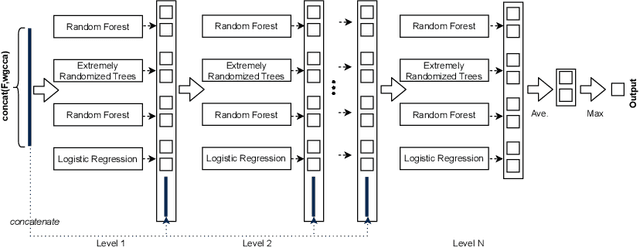Ahmed Alharbi
Cloned Identity Detection in Social-Sensor Clouds based on Incomplete Profiles
Nov 02, 2024



Abstract:We propose a novel approach to effectively detect cloned identities of social-sensor cloud service providers (i.e. social media users) in the face of incomplete non-privacy-sensitive profile data. Named ICD-IPD, the proposed approach first extracts account pairs with similar usernames or screen names from a given set of user accounts collected from a social media. It then learns a multi-view representation associated with a given account and extracts two categories of features for every single account. These two categories of features include profile and Weighted Generalised Canonical Correlation Analysis (WGCCA)-based features that may potentially contain missing values. To counter the impact of such missing values, a missing value imputer will next impute the missing values of the aforementioned profile and WGCCA-based features. After that, the proposed approach further extracts two categories of augmented features for each account pair identified previously, namely, 1) similarity and 2) differences-based features. Finally, these features are concatenated and fed into a Light Gradient Boosting Machine classifier to detect identity cloning. We evaluated and compared the proposed approach against the existing state-of-the-art identity cloning approaches and other machine or deep learning models atop a real-world dataset. The experimental results show that the proposed approach outperforms the state-of-the-art approaches and models in terms of Precision, Recall and F1-score.
Privacy-Aware Identity Cloning Detection based on Deep Forest
Oct 21, 2021



Abstract:We propose a novel method to detect identity cloning of social-sensor cloud service providers to prevent the detrimental outcomes caused by identity deception. This approach leverages non-privacy-sensitive user profile data gathered from social networks and a powerful deep learning model to perform cloned identity detection. We evaluated the proposed method against the state-of-the-art identity cloning detection techniques and the other popular identity deception detection models atop a real-world dataset. The results show that our method significantly outperforms these techniques/models in terms of Precision and F1-score.
Subjective Metrics-based Cloud Market Performance Prediction
Sep 21, 2020



Abstract:This paper explores an effective machine learning approach to predict cloud market performance for cloud consumers, providers and investors based on social media. We identified a set of comprehensive subjective metrics that may affect cloud market performance via literature survey. We used a popular sentiment analysis technique to process customer reviews collected from social media. Cloud market revenue growth was selected as an indicator of cloud market performance. We considered the revenue growth of Amazon Web Services as the stakeholder of our experiments. Three machine learning models were selected: linear regression, artificial neural network, and support vector machine. These models were compared with a time series prediction model. We found that the set of subjective metrics is able to improve the prediction performance for all the models. The support vector machine showed the best prediction results compared to the other models.
 Add to Chrome
Add to Chrome Add to Firefox
Add to Firefox Add to Edge
Add to Edge